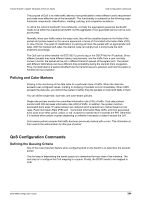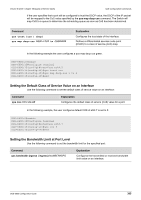D-Link DGS-6600-48TS Configuration Guide - Page 387
Scheduling
 |
View all D-Link DGS-6600-48TS manuals
Add to My Manuals
Save this manual to your list of manuals |
Page 387 highlights
Volume 6-QOS / Chapter 36-Quality of Service (QoS) QoS Configuration Commands Scheduling The scheduling of processing packets across multiple queues is a very important part of QoS. It is possible to configure the proper weight for each queue, so that different scheduling algorithms can be emulated. The weights should be configured as follows: Strict Priority: Configure each queue with quantum or weight 0. • Weight Round Robin: Configure each queue with weight n (n as 0~15). • Deficit Round Robin: Configures each queue with quantum n (n is project dependant). The port CoS queue can be either strict priority mode, deficit round robin (DRR) mode or Weight round robin (WRR) mode. The strict priority scheduler mode provides strict priority access to the egress port across the transmit priority queue from the highest priority index to the lowest. The purpose of the strict priority scheduler is to provide lower latency service to the higher CoS classes of traffic. DRR operates by serving a mount of backlogged credits into the transmit queue in round robin order. Initially, each queue set its credit counter to a configurable quantum value. Every time a packet from a CoS queue is sent, the size of the packet is subtracted from the corresponding credit counter. When the credit counter drops below 0, the queue is no longer serviced until its credits are replenished. All queues are serviced until their credit counter is zero or negative and a packet is transmitted completely. As this condition happens, the credits are replenished. When the credits are replenished, as quantum of credits are added to each CoS queue credit counter. The quantum for each CoS queue may different based on the user configuration. To set a CoS in strict priority mode, any higher priority CoS must be in strict priority mode. For example if you would like to set CoS 5 in strict priority mode, CoS 6 and 7 have to be in strict priority mode. WRR operates by transmitting permitted packets into the transmit queue in round robin order. Initially, each queue set its weight to a configurable weighting. Every time a packet from a higher priority CoS queue is sent, the number of the packet is subtracted from the corresponding weight. When the credit counter reach zero, the queue is no longer serviced until its weight is replenished. After all, the lower priority CoS queue has the service in turn. All queues are serviced until their weight is zero and a packet is transmitted completely. As this condition happens, the weights are replenished. When the weights are replenished, as weight are added to each CoS queue credit counter. The weight for each CoS queue may different based on the user configuration. Command qos {deficit-round-robin [COS-QUEUE quantum WEIGHT] | weight-round-robin [COS-QUEUE weight WEIGHT]} default qos Explanation Enable the Deficit Round Robin (DRR) / Weighted Round Robin (WRR) packet scheduling mechanism. To restore the packet scheduling mechanism, use the default form of this command. DGS-6600 Configuration Guide 387















